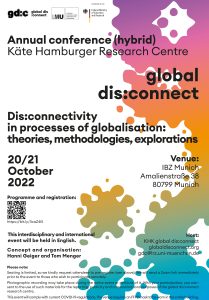20-21 Oct 22, Annual Conference Dis:connectivity in processes of globalisation
 Dis:connectivity in processes of globalisation: theories, methodologies, explorations
Dis:connectivity in processes of globalisation: theories, methodologies, explorations
gd:c annual conference (hybrid), 20-21 Oct 22
The first annual conference of the global dis:connect research centre aims to rethink our understanding of globalisation processes past and present. Global connectivity, which seemed unassailable just 15 years ago, is increasingly in turmoil. The disruption is both ideational, with the rise of anti-globalism and chauvinist nationalism as influential political currents, as well as material, as evidenced in protectionist curbs on global trade, the increasing prevalence of border walls, and global supply chains floundering due to pandemic and war. Talk of de-globalisation has become ubiquitous. This conference takes the current moment to ask whether we might not need a more sophisticated understanding of globalisation, both historical and contemporary. The participants will present new theories, methodologies and case studies to ground a new approach to globalisation — an approach that we denote as dis:connectivity — that notes how globalisation processes have always been characterised by a dynamic and co-constitutive relationship of connection and disconnection. Friction, absence, interruptions and detours are as integral to globalisation as are entanglement, exchange and connection. Since the rise of global history, global art history and global theatre history, scholars have arguably focused on questions of increasing connectivity. Already in 2017, the historian Jeremy Adelman warned of the blind spots of such a one-sided approach.[1] For global art history, Monica Juneja has recently pointed out the meaning of dis:connections in ‘world making’.[2] Overall, however, scholars have really just begun to think about what such a different approach to researching globalisation processes might look like theoretically, methodologically and thematically.[3]
As a research centre founded precisely to advance this research agenda, global dis:connect is delighted to host this annual conference, titled Dis:connectivity in processes of globalisation: theories, methodologies, explorations. We invite everyone to explore what theories, methodologies and cases might be best suited to research dis:connectivity. By focusing on theories and methodologies, as well as diverse case studies, this interdisciplinary and international conference aims to ground further study in this emerging field.
The conference will survey the range of dis:connectivity by bringing together historians, art historians and theatre scholars, reflecting the interdisciplinarity required to capture dis:connectivities in all their facets. Panels are structured around three themes that are particularly pertinent to our research: interruptions, detours, and absences. We will also bring scholars into conversation with creative professionals from the arts, whose approaches offer privileged access to the fluidity and transience that mark many of the phenomena in question.
Confirmed speakers are: Aleksandra Domanović, Valeska Huber, Richard M. Kabiito, Gabriele Klein, Anupama Kundoo, Peter W. Marx, Meha Priyadarshini, Kerstin Schankweiler, Promona Sengupta, and Sujit Sivasundaram.
On the evening of 20 October, the conference will also feature a conversation between the artist Parastou Forouhar and anthropologist Cathrine Bublatzky on The Global Dis:connect: embodiment and positionality as symbols of interruptions, detours and absences in Parastou Forouhar’s art. The conference will close on 21 October with a screening of the short film Atlantiques (Mati Diop, 2009) with a commentary by Fabienne Liptay.
Click HERE to download the flyer and HERE to download the programme.
Language: English
Venue: IBZ, Amalienstr. 38, 80799 Munich.
Conference concept and organisation: Hanni Geiger and Tom Menger.
[1] Jeremy Adelman, ‘What Is Global History Now?’, Aeon (blog), 2 March 2017, https://aeon.co/essays/is-global-history-still-possible-or-has-it-had-its-moment.
[2] Monica Juneja, ‘Awkward, unstable, creative: Dis:connection as world-making’, opening speech for the Käte Hamburger Research Centre global dis:connect, Munich, 12 May 2022.
[3] For one example, see: Zoltán Biedermann, ‘(Dis)Connected History and the Multiple Narratives of Global Early Modernity’, Modern Philology 119, no. 1 (2021): 13–32, https://doi.org/10.1086/714972.





